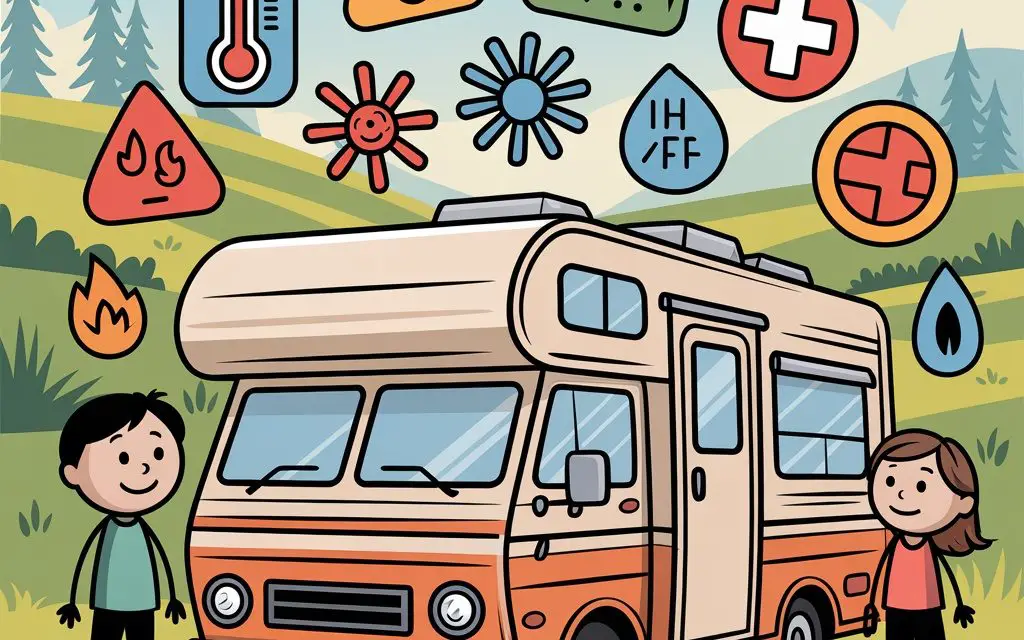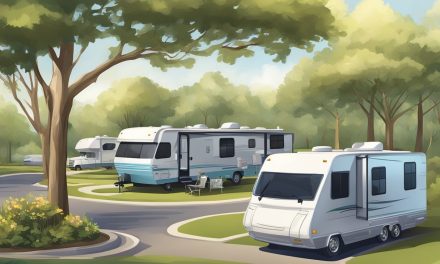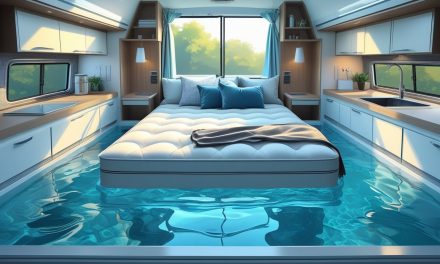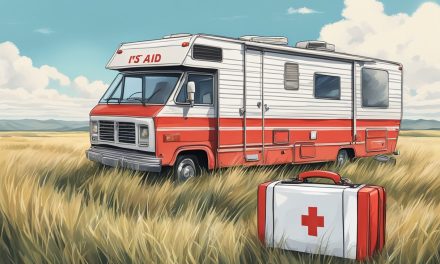RV living has exploded in popularity, with more families than ever choosing life on the road. But beneath all those Instagram-perfect sunset photos lies a troubling reality: RV living can seriously impact your health in ways most people never expect.
After analyzing thousands of RV health reports and speaking with full-time RVers, we’ve uncovered 15 major health problems that can develop when you live in an RV. Don’t worry though – we’ll also show you exactly how to prevent each one!
Why RV Living Can Be Dangerous to Your Health
The short answer? RVs are small, enclosed spaces filled with toxic materials and poor ventilation. When you add in constant movement, extreme temperatures, and limited healthcare access, you’ve got a recipe for health problems.
But here’s the good news: Most RV health issues are 100% preventable when you know what to look for.
The Top 15 Health Dangers of RV Living
1. Deadly Air Quality Problems
The Problem: RVs trap dangerous chemicals called VOCs (Volatile Organic Compounds) inside. These come from:
- Furniture glue and fabrics
- Cleaning products
- Building materials
- Carpet and flooring
Health Impact:
- Headaches and dizziness
- Breathing problems
- Eye and throat irritation
- Long-term organ damage
The Fix: • Open windows daily for fresh air circulation • Install high-quality air purifiers designed for small spaces • Use natural cleaning products only • Add houseplants that clean the air (spider plants, peace lilies)
2. Toxic Mold Growth
The Problem: RVs are mold magnets because of:
- Poor ventilation
- Temperature changes
- Water leaks
- High humidity from cooking and showering
Where Mold Hides:
- Under mattresses
- Behind wall panels
- In air vents
- Around windows
- Inside storage areas
Health Impact:
- Allergic reactions
- Respiratory infections
- Chronic fatigue
- Neurological problems
The Fix: • Run a powerful dehumidifier (small ones don’t work!) • Always use exhaust fans when cooking or showering • Check for roof leaks monthly • Install moisture-absorbing products in closets • Replace old caulk around windows and doorshttps://www.youtube.com/embed/3YtKPYBtdPk
3. Carbon Monoxide Poisoning
The Deadly Truth: Carbon monoxide kills more RVers than any other single cause. This invisible, odorless gas can come from:
- Your RV’s generator
- Nearby RVs running generators
- Faulty propane appliances
- Blocked exhaust systems
Warning Signs:
- Sudden headaches
- Dizziness or confusion
- Nausea and vomiting
- Feeling tired for no reason
Life-Saving Tips: • Install multiple CO detectors throughout your RV • Replace detectors every 5-7 years (most people forget this!) • Never run generators near open windows or doors • Have your propane system inspected annually
4. Fire Hazards Everywhere
Shocking Fact: RV fires spread 8 times faster than house fires due to lightweight, flammable materials.
Common Fire Causes:
- Electrical system overloads
- Faulty RV refrigerators (major recall issue!)
- Unattended space heaters
- Cooking accidents
- Propane leaks
Fire Prevention Checklist: • Keep multiple fire extinguishers in easy-reach locations • Never leave cooking unattended • Avoid using extension cords with space heaters • Check recall notices for your RV refrigerator regularly • Practice your escape plan monthly
5. Serious Ergonomic Problems
The Problem: RV furniture is designed to save space, not protect your body. This leads to:
- Chronic back pain from poor seating
- Neck problems from low ceilings
- Joint stiffness from cramped quarters
- Repetitive strain injuries
Body-Saving Solutions: • Invest in a high-quality mattress designed for RVs • Use ergonomic seat cushions and lumbar support • Take hourly stretch breaks during long drives • Set up an outdoor workspace when possible • Do daily exercises to counteract cramped living
6. Mental Health Challenges
The Hidden Crisis: 37% of full-time RVers report significant mental health struggles, including:
- Claustrophobia from small spaces
- Anxiety from constant uncertainty
- Depression from social isolation
- Relationship stress from lack of privacy
Mental Health Protection: • Create separate personal spaces within your RV • Schedule regular alone time outdoors • Join RV communities both online and in-person • Maintain routines even while traveling • Consider teletherapy if you’re strugglinghttps://www.youtube.com/embed/VttubmYdeZ4
7. Poor Nutrition and Food Safety
The Problem: Limited storage and cooking space leads to:
- Relying on processed foods (high sodium, chemicals)
- Inadequate refrigeration causing food spoilage
- Limited fresh produce intake
- Eating out too frequently
Healthy Eating Strategies: • Shop frequently for fresh foods • Invest in high-quality mini appliances • Learn meal prep techniques for small spaces • Grow your own herbs in containers • Plan nutritious meals in advance
8. Water Quality Issues
Scary Truth: 42% of RV water systems contain harmful bacteria, chemicals, or heavy metals.
Common Water Problems:
- Bacteria growth in holding tanks
- Chemical contamination from hoses
- Heavy metals from old plumbing
- Chlorine and treatment chemicals
Clean Water Solutions: • Install a whole-RV water filtration system • Sanitize your tanks monthly • Use only food-grade water hoses • Test your water regularly with home kits • Carry backup drinking water
9. Extreme Temperature Exposure
The Danger: RVs have terrible insulation, exposing you to:
- Heat exhaustion in summer
- Hypothermia in winter
- Dehydration from poor climate control
- Sleep disruption from temperature swings
Temperature Control Tips: • Upgrade insulation in problem areas • Use reflective window covers • Install efficient heating/cooling systems • Monitor humidity levels constantly • Dress in layers and have emergency supplies
10. Limited Healthcare Access
Real Consequences: Being far from quality healthcare means:
- Delayed treatment for serious conditions
- Skipped preventive care and checkups
- Medication access problems
- Emergency response delays
Healthcare Planning: • Research medical facilities before traveling • Maintain telehealth relationships with your doctors • Keep comprehensive medical records with you • Stock up on prescriptions before remote trips • Consider medical travel insurance
11. Pest and Wildlife Exposure
Hidden Health Threats:
- Disease-carrying ticks (Lyme disease, Rocky Mountain spotted fever)
- Mosquito-borne illnesses (West Nile, Zika)
- Rodent droppings (Hantavirus risk)
- Venomous snake encounters
Protection Strategies: • Seal all entry points to prevent rodents • Use effective insect repellents • Check for ticks daily after outdoor activities • Store food properly to avoid attracting pests • Learn local wildlife safety rules
12. Electrical System Dangers
The Risk: Faulty RV electrical systems cause:
- Electric shock injuries
- Fires from overloaded circuits
- Carbon monoxide from damaged systems
- Electrocution from improper grounding
Electrical Safety Rules: • Have your electrical system inspected annually • Never overload circuits • Use proper surge protection • Check GFI outlets monthly • Hire professionals for electrical work
13. Road Safety and Accident Injuries
Sobering Statistics: RV accidents are 3 times more likely to result in serious injury due to:
- Higher center of gravity
- Longer stopping distances
- Poor visibility
- Driver inexperience
Accident Prevention: • Take an RV driving course • Drive slower than you think you need to • Avoid driving in high winds or bad weather • Secure all items inside before moving • Use proper safety restraints for all passengers
14. Propane System Hazards
Life-Threatening Risks:
- Gas leaks leading to explosions
- Carbon monoxide from incomplete combustion
- Burns from improper handling
- Asphyxiation in enclosed spaces
Propane Safety Protocol: • Inspect your system monthly for leaks • Install gas detectors near floor level • Turn off propane when not in use • Never use propane appliances for heating • Get professional service for any problems
15. Sleep Disruption and Fatigue
The Problem: Poor sleep quality in RVs leads to:
- Chronic fatigue
- Weakened immune system
- Poor decision-making
- Increased accident risk
Sleep Improvement Tips: • Invest in blackout curtains • Use white noise machines • Maintain consistent sleep schedules • Create a comfortable sleeping environment • Limit screen time before bed
Quick Reference: RV Health Emergency Kit
Essential Items Every RV Should Have:
| Category | Must-Have Items |
|---|---|
| Air Quality | HEPA air purifier, CO detector, VOC test strips |
| Fire Safety | 3+ fire extinguishers, smoke detectors, escape ladder |
| First Aid | Comprehensive kit, prescription meds, emergency contacts |
| Water Safety | Water test kit, filtration system, sanitizing tablets |
| Weather Protection | Emergency heating/cooling, insulation materials |
Would you like to save this article?
When to See a Doctor Immediately
Get emergency help if you experience:
- Sudden, severe headaches
- Difficulty breathing
- Persistent nausea or dizziness
- Unexplained skin rashes
- Extreme fatigue
- Chest pain or irregular heartbeat
The Bottom Line: Can RV Living Be Safe?
Yes, absolutely! But only if you prepare properly and stay vigilant about potential health risks.
The key is education and prevention. Most RV health problems develop slowly over time, which means you can often prevent them entirely with the right knowledge and tools.
Remember: Your health is worth more than any Instagram-worthy sunset. Take these risks seriously, but don’t let them scare you away from the RV lifestyle you love.https://www.youtube.com/embed/fvrVxaOGxAA
Your Next Steps
- Audit your current RV for the health risks mentioned above
- Create an action plan to address your biggest concerns first
- Invest in quality safety equipment – it’s cheaper than medical bills
- Stay educated about RV health topics and safety updates
- Join RV communities where you can learn from experienced travelers
Sources:
- National Fire Protection Association – RV Fire Statistics
- Centers for Disease Control and Prevention – Carbon Monoxide Safety
- Environmental Protection Agency – Indoor Air Quality
- Recreational Vehicle Industry Association – Safety Guidelines
- American Red Cross – RV Safety Resources
- RV Safety & Education Foundation







